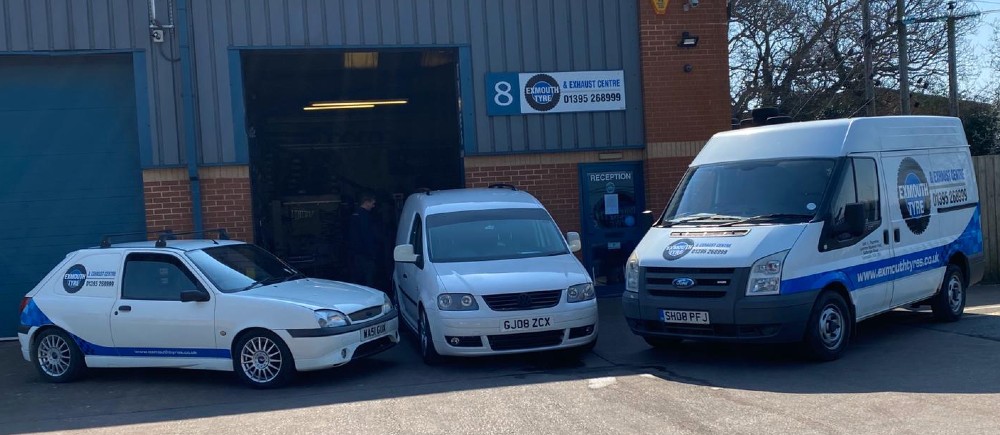The owner of Exmouth Tyre & Exhaust Centre, Ashley Heal, is a Re:Fuel regular. He also joined us on our very first Re:Fuel road trip, the pilot for our 1886 initiative. Having started out as a commercial vehicle mechanic in 1995, Ashley has owned Exmouth Tyre & Exhaust Centre since 2006. A great guy, with a burning passion for cars, road trips and motorsport, we always love bumping into him at Re:Fuel for a chat.

Over the years Ashley has built a vast knowledge of those big rubber round things that keep us stuck to the black stuff. So we asked him if he could list his top five useful tips and advice on how to look after your tyres and get the best out of what is always an expensive purchase. Take it away Ashley…
I’m a huge petrolhead – but we all have to admit, driving is one of the most dangerous things we do in our lives. We rely on four tyres with a contact patch the size of our hands to keep us travelling on the road safely. So whilst the advice I can give is great for making your tyres last longer and, therefore, saving you money – if your tyres are not looked after properly this will seriously impact on the safety of both you and others on the road. Some also don’t realise that if you happen to get stopped by the Police, you could be landed with a fine of £2,500 and 3 penalty points per tyre that doesn’t meet the legal requirements.
Anyway, I’m not here to spread doom and gloom – just to give some useful tips and help keep my fellow Re:Fuellers safe. So here a few simple ways to help maintain your tyres and keep you safe on your travels:
1. Research the correct tyre for your vehicle
The size will be written on the side wall of your current tyre. But it’s not just very important that you get the correct size, you also need to look at the rating and make sure the correct tyre for the vehicle, its weight and its intended use is fitted. For example, some heavier vehicles will need a higher load rating, sports cars may require high performance tyres and vehicles that do long distance journeys may prefer a tyre offering to be more economical. Also, if you’ve bought a used car or aftermarket wheels, don’t assume that the right tyres are necessarily fitted! Check your handbook, or consult a tyre fitting centre.
2. Buy the best tyre you can afford
This will make a huge difference to durability, stopping distances and overall safely. Obviously steer clear of ultra low budget tyres – but once you know your budget, shop for special deals and offers that might allow you to move up into as high a quality tyre as possible without spending any extra money. You do it in the supermarket – so why not for your tyres!
3. Check tyre pressures regularly
This will help your tyres last longer, be more efficient and generally provide a smoother ride with maximum grip. Now I know with modern technology many newer vehicles have on board computers that tell you if your tyre pressures are low. That’s all well and good but, like any technology, it can go wrong sometimes – so don’t rely on it 100%. I would always suggest doing it the old fashioned way as often as you can. Either buy yourself a quality pump and gauge, or nip in to your local garage for the technician to check them for you, at least once a month. You can of course find tyre pressure gauges at petrol stations but these aren’t always the most reliable source and can often be quite inaccurate. Oh and anyone who doesn’t already know, your correct tyre pressure can usually be found written inside your front door shut, petrol cap or, failing that, it’ll of course be in your owners handbook.
4. Regular visual inspection
Check for damage, cuts, bulges and uneven wear on the tyre. I recommend getting into the habit of doing a quick condition check at the same time as washing your car. You may notice a potential problem before it happens. For example a puncture or possible blow out. If you’ve got your own compressor and gauge then you can roll up your wash, pressure check and condition check all into one regular “car care” time. Of course, it’s not always easy to check the inside walls of tyres, so an occasional trip to your local garage or tyre centre is also a good idea.
5. Check your wheel alignment
If you notice uneven wear on tyres, the last thing you want to do is keep replacing them due to uneven wear on the tread. Instead, look into having your wheel alignment checked or “tracking” as some people know it. Uneven wear is likely down to the angles/geometry of the wheels being out of manufactures specifications. This could mean the “track rods” that control your steering need adjusting, various metal arms that form your suspension could be misaligned, or perhaps even one or more rubber bushes have perished. Any of these things will cause unnecessary wear and tear, needless expense, and maybe even the feeling of your vehicle pulling to one side. Carrying out wheel alignment will ensure your vehicle travel is true and straight.
Thanks Ashley. Some great advice to keep us all safe and save us a few of our hard-earned money. Ashley was also kind enough to donate an item for our auction this Sunday (19th April) during our April Digital Event, where 100% of the money raised will be going to the NHS Charities Together COVID-`19 appeal to support NHS staff an volunteers.
At Re:Fuel we love supporting local businesses – especially those like Exmouth Tyre & Exhaust Centre, built solely on the word of mouth of their great customer service and prices. If you’re local to Exmouth then why not pop in to say hi and see what they have to offer.
